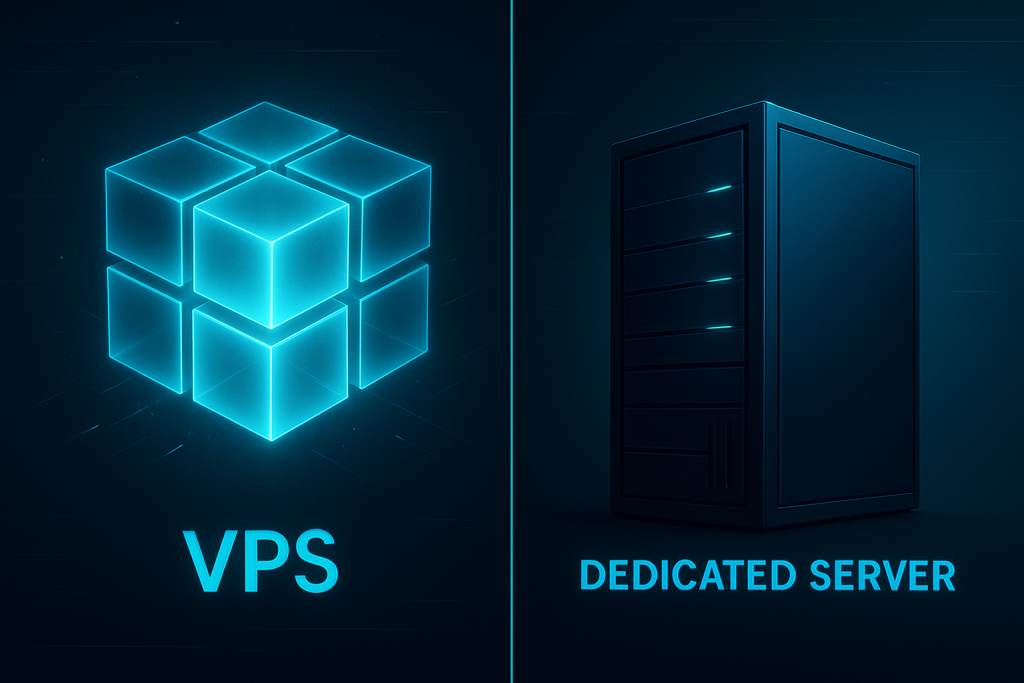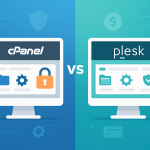As your online presence evolves from a simple blog or brochure site into a bustling hub of activity, the limitations of shared hosting become glaringly apparent. Sluggish performance during traffic spikes, restrictive server configurations, and potential security risks from “bad neighbors” are all signs that it’s time to upgrade. For those at this critical juncture, the path forward typically leads to a choice between two powerful solutions: a Virtual Private Server (VPS) and a Dedicated Server.
In 2025, the technology behind both options has matured significantly, blurring some lines while sharpening others. A VPS offers an incredible balance of performance, control, and cost-effective scalability. A dedicated server remains the undisputed champion of raw power, security, and complete autonomy. Choosing the right one is not just a technical decision; it’s a strategic investment in your website’s future. This comprehensive guide will dissect every facet of VPS and dedicated hosting to help you make the most informed choice.
At a Glance: Key Differences in 2025
| Feature | VPS Hosting | Dedicated Hosting (Bare Metal) |
| Core Technology | A physical server is partitioned into multiple isolated virtual machines using a hypervisor. | A single physical server is leased entirely to one client. No virtualization layer. |
| Resource Allocation | Guaranteed, dedicated resources (CPU, RAM) within a virtualized environment on a shared server. | 100% of the server’s physical resources are exclusively for one client. |
| Performance | Good to excellent. Consistent, but can be theoretically impacted by extreme “noisy neighbor” issues at the hardware I/O level. | The absolute highest and most predictable performance. Ideal for sustained, heavy loads. |
| Scalability | Excellent. Resources can be scaled up or down instantly or with a quick reboot, often via a control panel. | Limited and slow. Requires physical hardware changes, which means scheduled downtime. |
| Control & Customization | High. Full root access to the virtual server to install custom software and configure the OS. | Ultimate. Complete control over hardware (RAID configurations, NICs) and all software. |
| Security | High. Isolated environments prevent other users from accessing your files or data. | Maximum. Physical isolation eliminates all risks associated with shared hardware. |
| Cost | More affordable. Entry-level from ~$10/month, powerful plans from ~$60-$150/month. | Significantly more expensive. Entry-level from ~$100/month, high-end can exceed $500+/month. |
| Best For | Growing websites, SMBs, SaaS applications, development environments, and agencies. | High-traffic e-commerce, large enterprises, big data, game servers, and compliance-heavy apps. |
Deep Dive: The Technology Behind the Hosting
To truly understand the pros and cons, it’s essential to look under the hood at how each hosting environment is constructed.
What is a VPS? The Power of Virtualization
A Virtual Private Server operates on a fascinating principle: one powerful physical server can act as a host for multiple, independent virtual servers. This is achieved through a technology called a hypervisor (like KVM, Xen, or Hyper-V). The hypervisor slices up the physical server’s resources—CPU cores, RAM, and storage—and allocates a dedicated portion to each VPS.
For you, the end-user, this partitioned space behaves exactly like a standalone server. You get:
- Guaranteed Resources: The 4 vCPU cores and 8 GB of RAM you pay for are yours alone and cannot be used by another VPS on the same machine. This is a massive leap from shared hosting, where resources are a free-for-all.
- Root Access: You have complete administrative control over your virtual environment. You can install any compatible operating system (like Ubuntu, CentOS, or Windows Server), tweak server settings, and install specialized software like Node.js, Redis, or specific PHP modules.
- Isolation: Your VPS is a self-contained sandbox. A security breach or software crash on a neighboring VPS has no direct impact on your environment, ensuring higher stability and security.
In 2025, KVM (Kernel-based Virtual Machine) is the dominant hypervisor technology for high-quality VPS hosting, offering “full virtualization” that provides a higher degree of isolation and performance consistency compared to older, container-based methods.
What is a Dedicated Server? The Might of Bare Metal
Dedicated hosting is the pinnacle of simplicity and power. There is no virtualization, no sharing, and no neighbors. You are leasing an entire physical machine—often called “bare metal”—that sits in a data center. Every single CPU clock cycle, every byte of RAM, and every bit of storage I/O is exclusively yours.
This direct access to hardware provides:
- Unrivaled Performance: Without a hypervisor layer, there is zero overhead. Your applications have direct, unfettered access to the hardware, resulting in the best possible performance for demanding tasks like large database queries, real-time data processing, or video transcoding.
- Complete Hardware Customization: You can dictate the exact specifications of your server. Need a 24-core AMD EPYC processor for parallel processing? Need 256 GB of DDR5 RAM for a massive in-memory database? Need a specific RAID configuration (like RAID 10) across four NVMe SSDs for maximum I/O speed and redundancy? A dedicated server provides this granular level of control.
- Absolute Security and Compliance: For businesses handling sensitive financial data, health records (HIPAA), or personal information (GDPR), the physical isolation of a dedicated server is often a non-negotiable requirement for compliance. There is no shared hardware, eliminating a whole class of potential security vectors.
Head-to-Head Comparison: The Key Decision Factors
1. Performance and Predictability
A high-quality VPS can handle significant traffic and demanding applications with ease. However, the ultimate performance ceiling is dictated by the underlying physical hardware and the other users on it. While your RAM and CPU are dedicated, you are still sharing the server’s network connection and disk I/O channels. In a rare “noisy neighbor” scenario, a user aggressively hitting their disk storage could theoretically create a minor bottleneck for others.
A dedicated server offers predictable, consistent, and untethered performance. It’s the perfect solution for applications where even milliseconds of latency matter. High-volume e-commerce stores during a Black Friday sale, popular mobile app backends, and busy SaaS platforms all rely on this unwavering power to deliver a flawless user experience.
Winner: Dedicated Hosting
2. Scalability and Flexibility
This is where VPS hosting holds a decisive advantage. The virtual nature of a VPS means resources can be adjusted with incredible ease. Is your website going viral? Log into your hosting provider’s dashboard, move a slider to increase your RAM from 8 GB to 16 GB, and reboot. The entire process can take less than five minutes. This agility is invaluable for businesses with fluctuating traffic patterns or those in a rapid growth phase.
Scaling a dedicated server is a far more deliberate and physical process. Upgrading RAM or adding a new drive means submitting a support ticket, scheduling a maintenance window, and having a technician physically open the server chassis to install the new hardware. This inevitably involves downtime and lacks the on-demand flexibility of a VPS.
Winner: VPS Hosting
3. Management and Technical Expertise
Both VPS and dedicated servers come in two primary flavors: managed and unmanaged. This choice is just as critical as the hosting type itself.
- Unmanaged Hosting: You are given the server with just the operating system installed. You are 100% responsible for everything else: installing the webserver (Apache/Nginx), setting up the database, configuring security firewalls, managing backups, and applying all software patches and updates. This requires significant technical expertise (or a dedicated system administrator) but offers the most control and the lowest cost.
- Managed Hosting: The hosting provider handles all the core system administration tasks. They take care of security hardening, updates, backups, and performance monitoring, often providing premium support. This comes at a higher price but allows you to focus solely on your website and business, making it an excellent choice for those without a dedicated IT team.
This factor applies to both, but the stakes are higher with a dedicated server, where you are responsible for the entire physical machine.
Winner: Tie (Depends entirely on your choice of a managed or unmanaged plan)
4. Security
A VPS is inherently secure due to its isolated environment. One user’s mistake won’t compromise your server. However, both you and your neighbors are reliant on the security of the host’s underlying hypervisor. While hypervisor vulnerabilities are exceedingly rare with reputable providers, it remains a theoretical attack vector.
A dedicated server provides the ultimate security blanket. With complete physical isolation, you eliminate any and all risks associated with co-tenant hosting. You have full control to implement advanced security measures, such as custom hardware firewalls, intrusion detection systems, and end-to-end encryption, making it the gold standard for security-critical applications.
Winner: Dedicated Hosting
So, Which One Should You Choose in 2025?
The best choice is the one that aligns with your website’s specific needs, your budget, and your technical comfort level.
Choose VPS Hosting if…
- You’ve outgrown shared hosting: Your traffic is growing, and you need more power and control than a shared plan can offer. A VPS is the perfect, cost-effective next step.
- Your budget is a key consideration: VPS hosting provides a large slice of dedicated server features at a fraction of the price, offering an excellent return on investment.
- You need to scale resources quickly: You anticipate rapid growth or have seasonal traffic spikes. The ability to instantly add or remove resources is a major operational advantage.
- You’re an agency or developer: You need to host multiple client websites or manage various development/staging environments. A single, powerful VPS can be partitioned to handle these workloads efficiently and securely.
- You run a medium-traffic e-commerce store or SaaS app: A robust VPS has more than enough power to run platforms like Magento or WooCommerce and support a growing user base for your application.
Choose Dedicated Hosting if…
- You run a high-traffic, mission-critical website: Your business depends on consistent, high-speed performance for thousands of simultaneous users. E-commerce giants, major online publications, and popular SaaS platforms fall into this category.
- Security and compliance are non-negotiable: You handle sensitive data like financial transactions, patient records, or private user information that requires the highest level of security and physical isolation for compliance (e.g., HIPAA, PCI-DSS).
- You have very specific hardware needs: Your application requires a custom server configuration, such as specialized GPUs for machine learning, massive amounts of RAM for data analytics, or a particular RAID setup for your database.
- You need to run resource-intensive applications: This includes things like dedicated game servers (e.g., for Minecraft or Valheim), video streaming and transcoding services, or large-scale database hosting.
- Your budget can accommodate a premium solution: You view hosting as a core business investment and are willing to pay for the absolute best in performance, security, and control.
Ultimately, the choice in 2025 is clearer than ever. VPS hosting is the versatile, scalable, and powerful workhorse for the vast majority of growing businesses and projects. Dedicated hosting is the specialized, high-octane solution for when performance and security demands are absolute and uncompromising. Evaluate your trajectory, analyze your requirements, and choose the platform that will not only support your website today but also empower its growth for years to come.



